EFA Membership
End 2023, EFA gathered 45 member associations in 26 countries. Unfortunately, we had to say goodbye to two members: Česká iniciativa pro astma (CIPA) from Czech Republic, who unfortunately was unable to actively engage in EFA activities and decided to exit, and Asthma + Lung UK, who declared doing it so because of changing their strategic priorities to be more focused on national ones.
As the patient movement continues to develop, EFA is in the ongoing process of the expansion and strengthening of our various patients’ communities. Throughout 2023, EFA continued liaising with a pool of seven patient groups or existing patients’ associations on food allergy, allergy, atopic eczema, and asthma, out of which coming from four countries that are not currently represented within the EFA Community. Specifically, EFA supported two organisations, the first ones for EFA from Bosnia and Herzegovina and Malta, who decided to start application process to join EFA.
EFA Members’ Community
EFA’s members represent a diverse community of food allergy, anaphylaxis, atopic eczema, allergy, asthma and allergy, COPD, and broader lung diseases national patient associations. Their memberships vary from 100 up to 35,000 patients or carers. Their size and operational capacities are very different too, from none to 80 full time employees, in addition to volunteers.
Every year, EFA organises a meeting for EFA membership. EFA’s Community Meeting took place in April following the AGM in Gent, Belgium, that gathered 24 members from 20 European countries. It was the first time that we set up a Community Meeting Committee, composed of four members from Belgium, Iceland, Italy, and Poland. As a result of EFA’s effort to reinforce the community with interactions and quality engagement, seven members shared their best practices in detail during the meeting. The community also engaged in a discussion on the strategic use of social media for patient advocacy and the national experiences on managing food allergies, intolerances, and special needs in events.
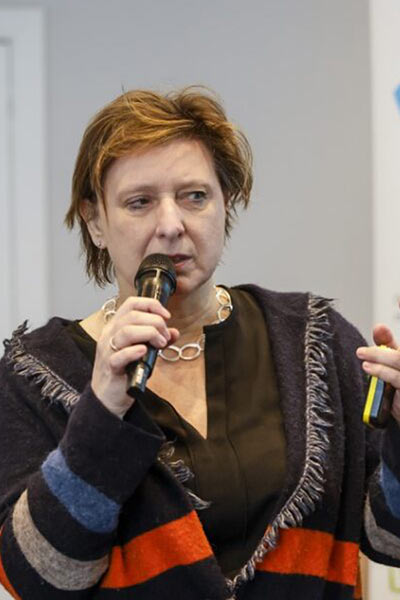
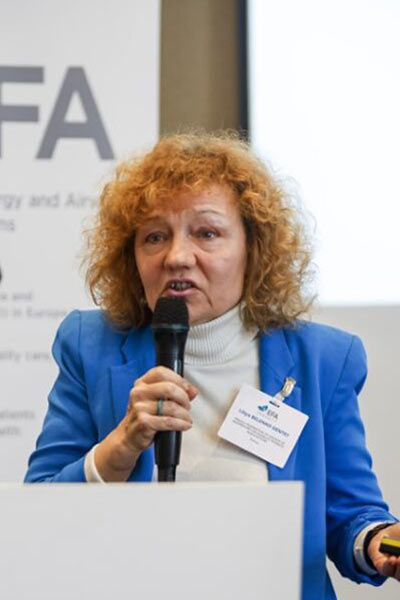
Gundula Koblmiller (Austrian Lung Union) and Liliya Belenko Gentet (FFAAIR) presenting their learning experience during EFA Sustainable Mentorship Programme
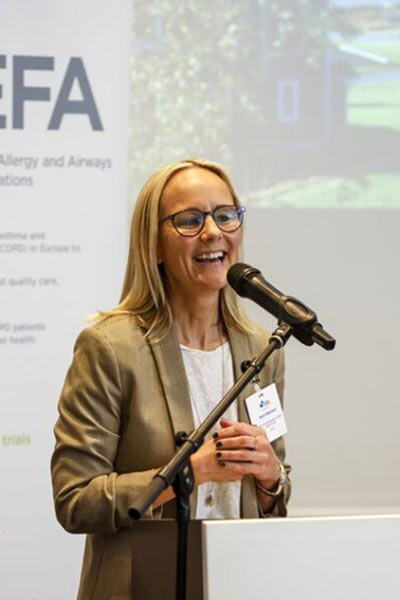
Karin Neuhaus (Swedish Asthma and Allergy Association) presenting the best practice titled “A safe stay – Sodergarden, the allergy friendly hostel in northern Sweden”
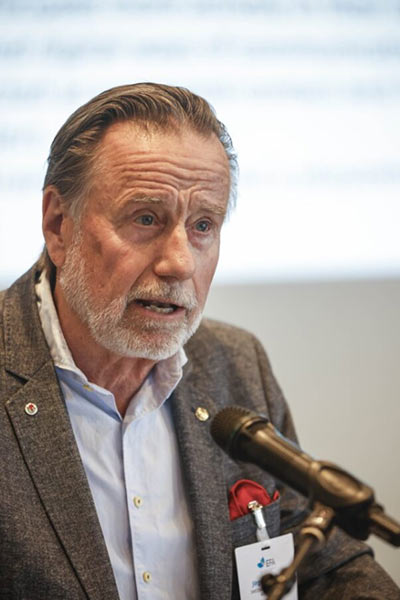
Jörgen Warberg (Swedish Heart and Lung Association) presenting its best practice on “patient experiences of digital care for COPD patients”
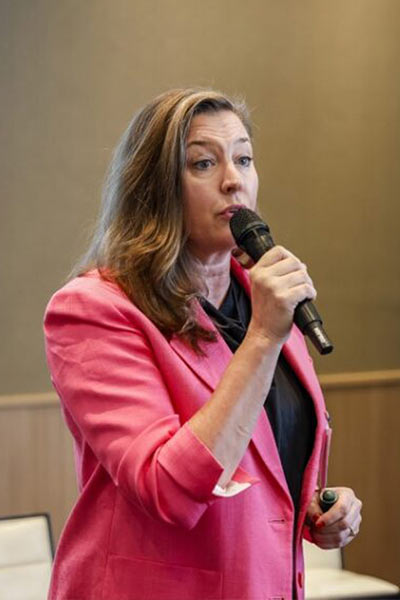
Niki Malmros (Finnish Allergy and Asthma Federation) presenting the best practice on “Nature health and effect of Natural Microbes on Allergies and Asthma”
Session 4 - Sharing Best Practices Towards European Guidance on Managing Food Allergies, Intolerances and Special Needs of People We Represent in events (speakers)
To increase members’ engagement, in 2023 EFA developed two crucial tools for the community:
- a full Membership Survey, to understand EFA’s Members Community, their priorities and goals, to evolve together;
- and our first welcome pack for new members, a tool enriched with the guidance of three recent members.
Both tools will be first used towards the upcoming EFA 2024 AGM.
EFA Working Groups
EFA’s daily community work is organised through six Working Groups that are classified in four disease specific working groups (atopic eczema, asthma & allergy, food allergy and COPD) and two cross-cutting configurations (prevention and patient education).
In 2023, all EFA working groups held 11 meetings (including four in-person meetings that took place during the Community Meeting. As EFA’s office and members’ engagement in the different working groups varies depending on the configuration and topic, the functioning and mobilisation of the working groups was a core subject of the discussions during the Community Meeting.
EFA Office
In a changing environment with hybrid work, more tools to engage organically and an organizational ambition to work as a community, EFA office went through a profound transition starting in 2022 and that will culminate in 2024.
In 2023, EFA launched four multiannual programmes with yearly workplans.
|
Multiannual programme 2022-2024 |
2023 workplans |
|
EFA Community Programme |
Members’ community: communities based working groups with EFA Members on asthma, COPD, allergy, atopic eczema, food allergy |
|
Partners’ community: civil society partner organisations and sustainable corporate partners with disease specific community interest |
|
|
Community advocacy: EFA collaboration with international and European institutions, such as the World Health Organisation and the European Commission |
|
|
Community projects: BREATHE by 2030, European Parliament Interest Group on Allergy and Asthma and European Allergy and Asthma Youth Parliament, and Capacity Building |
|
|
EFA PREVENT Programme
|
Prevention advocacy: EFA core policy work driving change for our community at European level with EU legislation and agencies (ECHA and EFSA), WHO Europe and the FAO/WHO Codex Alimentarius Commission |
|
Prevent projects: EU-Funded project SynAir-G |
|
|
EFA CARE Programme
|
Care advocacy: EFA core policy work driving change for our community at European level with EU legislation and agencies (EMA), and WHO Europe. |
|
Care projects: COPD Community project on Standards of Care for COPD in Europe, and atopic eczema community project for World Atopic Eczema |
|
|
EFA Climate Change Programme
|
Climate advocacy: EFA core policy work building the case for EFA community’s key role to inform climate change health impacts and mitigation policies at EU level, through WHO ATACH and UNFCCC |
|
Climate projects: Positioning patients with allergies and respiratory diseases, and health impact into International/European level processes through identifying foundations to resource this work |
In 2023, EFA team experienced a substantial development, growing from 8 to 11 staff, welcoming specialized colleagues on membership engagement, programme, and digital development.
EFA is an ambitious organization stemming from the community and steered by the Board. We also drafted an organisational development implementation plan 2023-2024 for a thriving, effective staff, to deliver on the programmes. We adopted the logical framework as our new planning tool and identified and trained staff on newer project management tools to enable the office better to address the complex, multifaceted and cross-timeline programmatic work of EFA. We also established monthly reporting processes, with internal templates and meetings focused on activity impact. As our timelines depend on the support received, 2023 EFA projects started fluently when confirmed, and we extended finalising activities in BREATHE Vision 2030, Capacity Building, and our Atopic Eczema projects in early 2024.
EFA also launched an organisational development for our office team to become more effective in serving our communities.